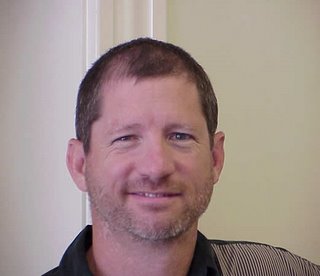As funny as a rubber crutch
He's John Dorhauer, a United Church of Christ clergyman who contributes regular
 ly to the Talk2Action blog. The guy is a stitch! I mean, the broad irony and subtle self-parody in his pseudo-pretentious writing is priceless. He affects this mien of taking himself and the subject matter oh so seriously, but yet you just KNOW he can't be serious. And talk about a poker face! He never breaks a smile, never lets on that he's pulling your leg, never winks at his audience. He just plays it straight, as if his preposterous claims actually were intended to make sense.
ly to the Talk2Action blog. The guy is a stitch! I mean, the broad irony and subtle self-parody in his pseudo-pretentious writing is priceless. He affects this mien of taking himself and the subject matter oh so seriously, but yet you just KNOW he can't be serious. And talk about a poker face! He never breaks a smile, never lets on that he's pulling your leg, never winks at his audience. He just plays it straight, as if his preposterous claims actually were intended to make sense.Take his most recent little humor piece, for example: "Wolves in Sheep's Clothing." I'll give you a moment to read it...
Don't you just love the mock tone of concern, the deep alarm and furrowed-brow instruction? Those church ninjas dispatched by IRD are ubiquitous, and with their training in dismantling churches, you'll be lucky to have one 2X4 attached to another if you aren't careful.
Full alert, America! Somebody might want to effect meaningful change in a church somewhere. Watch out! Hoo-eee! It's a kick.
You can't help but chuckle at the broad irony of Dorhauer describing this sitting-duck "extreme welcome" church that succumbs to paranoia about apparently well-intended visitors whose only desire is to exploit the congregation because they are "[t]rained by others in the art of dissent, they are clever manipulators of thought and action who know the things that make for unrest."
Yeah. Right. Those people, with no mind of their own but total willingness to go wherever there is a church to be dismantled, have become kind of destroyer zombies under the command of the all-powerful IRD, who everyone just knows is lying in its mission statement and cares nothing about theology or churches or Christian discipleship. What an evil villain! Where's Superman when you need him? Right, Dorhauer? Talk about laying it on thick! Dorhauer knows humor.
But the juiciest irony Dorhauer employs is the bit about the church in which "there will always be an atmosphere of open and mutual respect," and in order to show that "openness" to others and "respect" for their ideas, the church becomes paranoid and exclusive, taking pains that "no one should be asked to join the church unless and until they can demonstrate their appreciation for and comfort with this openness."
Har har! He's got the church saying, in effect, "We're so open that we won't let you in if you're not as open as we think you ought to be! We're so inclusive that we'll exclude anyone who is not just like us!" And, get this: not a hint that there is any irony here. He just plays it straight. What a hoot! That Dorhauer just cracks me up.
Oh, there's more, such as progressive churches discovering that it might be a good idea to ask new members what they believe or to have some standards for membership, or to actually know people before they are made members or--get this--top leaders of the church! Keep that up, and these progressive churches could become conservative!
Well, if you have to explain humor, it's not that funny. So I'll lay off. Dorhauer's classic humor is easy to find. It's deeply embedded in just about everything he writes for Talk2Action. And his buddies aren't bad, either. Their conspiracy satire reads almost as if they believe it.
But nobody could be THAT ridiculous. Could they?
